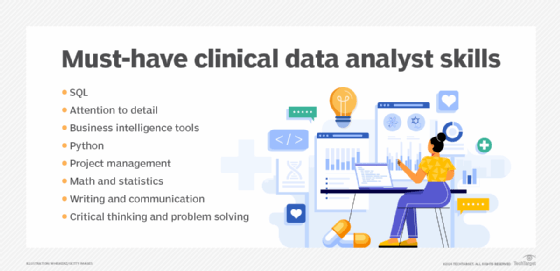clinical data analyst
What is a clinical data analyst?
A clinical data analyst -- also referred to as a healthcare data analyst -- is a healthcare information professional who verifies the validity of scientific experiments and data gathered from research.
The purpose of these data analytics is to verify that processes and protocols are followed, improving the quality and efficiency of healthcare. Clinical data analysts serve as the human element in clinical business intelligence (BI).
This clinical data management role requires the analyst to integrate healthcare data and other relevant information from a broad range of sources, including clinical research data, electronic health records, insurance claims data, health surveys, clinical trials and sometimes even patient monitoring devices.
Clinical data analysts interface with research teams, care staff and management. Analysts also report the results of clinical BI to management, stakeholders and other interested parties at insurance companies, hospitals, clinics and health analytics companies.
What are the responsibilities of a clinical data analyst?
The role of a clinical data analyst can include the following:
- Validating results and conclusions from experiments and data from research for use in clinical business intelligence systems.
- Training staff on the use of software programs and data management procedures.
- Overseeing data management activities, both external and internal.
- Implementing study-specific procedures to ensure compliance with existing regulations and procedures.
- Performing quality checks to ensure compliance and monitoring data management policy effectiveness.
- Designing, deploying and testing data collection systems and contributing to the implementation and maintenance of institutional data management plans.
What skills and experience does a clinical data analyst need?
A bachelor's degree in healthcare, computer science, biology, chemistry or another healthcare-related field of study is generally required for entry-level positions. However, a master's degree is often preferred by employers and could lead to better offers for applicants with less experience. Areas of advanced study include health informatics, clinical research administration and biotechnology.
In addition to earning either a bachelor's or master's degree, U.S. and Canada candidates can also benefit from earning certifications from the Canadian or American Health Information Management Associations, further demonstrating verified skills, knowledge and commitment.
Experience in clinical research is a plus, as is education or experience in data analysis. Because of the medical nature of the work, it's generally recommended that clinical data analysts have at least two years of medical experience, preferably working with data.
One of the most important skills a clinical data analyst can possess is strong communication skills. Those skills have obvious value in teaching, training and communicating policy but can be even more important to the analyst's success in working with a wide range of contributors and stakeholders, including doctors, researchers, care managers, administrators, other data analysts, IT professionals and sometimes even patients.

Salary and job outlook for a clinical data analyst
According to Salary.com, as of May 28, 2024, a clinical data analyst's salary typically falls between $61,828 and $86,667. The rate of pay depends on education, certifications, location and years of experience.
According to Zippia, salaries for clinical data analysts have grown by 15% over the past five years. Zippia research also indicates that the demand for clinical data analysts is increasing, with about 11,000 new positions projected over the next decade. This will more than double the number of clinical data analysts working in the U.S
What are some alternative careers?
Roles like the clinical data analyst cover a considerable range. In the realm of analytics, there are the market research analysts and actuarial analysts in health insurance. The role of operations research analyst is also common in many industries.
Beyond analytics, the healthcare industry also offers opportunities in medical records management and healthcare data management, as well as several administrative roles.
Healthcare data has become a lucrative target for ransomware attacks in recent years. Learn how healthcare organizations can safeguard healthcare data, including clinical observations, prescriptions and payment information.
